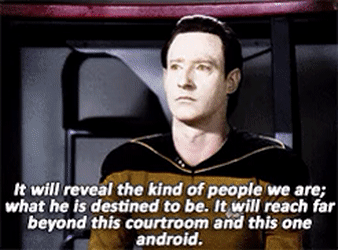The measure of a them
What the first great episode of Star Trek: The Next Generation has to say about trans rights
(Hello. This is very different from my usual posts. But I’ve recently been re-watching Star Trek: The Next Generation, and I wanted to write about this particular episode. So I did. And here it is. OK thanks.)
“It sits there looking at me, and I don't know what it is.”
Phillipa Louvois sits in her chair, judge and jury, a sharp woman in a tight blue uniform. She’s clearly moved. The gravity of the question before her is immeasurable, and it’s not lost on her as she struggles to come to a conclusion — one that, by her own admission, is beyond her station.
“This case has dealt with metaphysics, with questions best left to saints and philosophers. I'm neither competent nor qualified to answer those. I've got to make a ruling, to try to speak to the future.”
As a character in a serial TV show that largely resets at the end of each episode, her conclusion isn’t a surprise. To the viewer who has watched just over a season of Star Trek: The Next Generation to get to this episode — broadly considered one of the highest points of the series, and the first great episode of TNG — the answer is screamingly obvious.
Lieutenant Commander Data must be granted agency over his own body.
Louvois begins her judgment, in the quote at the top of this piece, referring to Data as “it.” But she quickly reverts:
“Is Data a machine? Yes. Is he the property of Starfleet? No. We have all been dancing around the basic issue. Does Data have a soul? I don't know that he has. I don't know that I have. But I have got to give him the freedom to explore that question himself. It is the ruling of this court that Lieutenant Commander Data has the freedom to choose.”
The Measure of a Man is top tier Star Trek. The episode is set within the confines of a small, scarcely staffed starbase, but its implications ripple throughout federation space for the future of all androids who may come after Data. At its heart, the episode is a philosophical courtroom drama that, even for an early Star Trek episode, makes little of its spacefaring context.
Star Trek has always tested the boundaries of personhood, and this is one of the most standout examples. In the The Original Series, Spock and the Vulcans make us contemplate the duality of emotion and logic. In Deep Space 9, we’re introduced to Odo, the shapeshifter whose essential form is fluidic and who yearns for The Great Link, a lake of persons intertwined to become one singular whole, fearful of any outgroup. In Voyager, we have The Doctor, a self-aware hologram who is eventually even able to leave the confines of not only the medical bay his work is tied to but the ship itself. And throughout the franchise, the Borg’s assimilationist hive mind confronts individuality.
With Data, the human experience is at its most explicit and is at least encoded into the subtext of any episode that features him prominently. The Measure of a Man pushes the issue from subtext into the text itself. And while the writer likely had other issues in mind while writing it, it’s hard not to watch the episode with today’s fight for trans rights in mind.
Debating Data’s right to choose
At stake in the episode is Data’s right to self-determination. Commander Bruce Maddox is proposing to disassemble Data. As an engineer, he’s assembled a positronic brain — the black box that Data operates with and that has never been replicated outside Data’s brother, Lore — and wants to study Data as a method of troubleshooting.
The disassembling isn’t the problem. It’s the reassembling that’s the catch: the procedure could have irreversible effects on Data’s personal memories. When Space Dad/Captain Jean Luc Picard declines to submit his crew member to the test, Maddox presents a transfer order reassigning Data to a starbase under his own command. When Data then resigns from Starfleet, Maddox challenges, claiming Data is Starfleet’s property.
What follows is a court case to determine whether Data is person or property. Picard is chosen to defend Data’s personhood while Commander William Riker is chosen against his will to prosecute the case for Data as property, under the threat of a summary ruling against Data if he doesn’t take on the role and argue it effectively. (The shoehorning of Riker into the role of lawyer is one of the episode’s misses — it makes little sense when Maddox is not only willing to make the argument that Data is property but is the active proponent of this belief.)
Riker ends his argument dramatically, removing Data’s arm and, with the flip of a switch, turning him off. “Pinocchio is broken. Its strings have been cut,” he says, leaving the room in a stunned silence. As he returns to his seat, he’s visibly shaken by his own words.
After requesting a recess, Picard, devastated, seeks counsel with Guinan as she tends the bar at Ten Forward.
“Maddox could get lucky and create a whole army of Datas, all very valuable,” Guinan says. “He’s proved his value to you.”
Picard agrees with the latter point. But Guinan goes a step further, suggesting a finding that Data is property would increase his value:
“Consider that in the history of many worlds there have always been disposable creatures. They do the dirty work. They do the work that no one else wants to do because it's too difficult, or too hazardous. And an army of Datas, all disposable, you don't have to think about their welfare, you don't think about how they feel. Whole generations of disposable people.”
Picard balks. “You’re talking about slavery.”
“I think that’s a little harsh,” responds Guinan.
“I don't think that's a little harsh. I think that's the truth. But that's a truth we have obscured behind a comfortable, easy euphemism. Property. But that’s not the issue at all, is it?” Picard’s words end the scene, and we’re taken back into the courtroom.
The parallels to slavery are striking, as they’re clearly intended to be. But I doubt the writer of the episode, former attorney and sci-fi novelist Melinda M. Snodgrass, anticipated the episode would find such relevance in the fight for trans rights more than 30 years later. (That being said, I don’t think she’d object, based on a search of her Twitter (no) feed for the word “trans.”)
In fact, the episode’s connection to transphobia is the same as its connection to anti-Black racism. Both are about control and maintaining our white, heteronormative, patriarchal hegemony, and about restricting bodily autonomy to that end.
Identity is not biology
Star Trek has seen many villains, from the Borg to the Cardassians to the Dominion.
But Maddox’s villainy, while certainly not the worst, is personal to the viewer. He’s actively seeking to subjugate a main character, a crew member we’ve seen grow as a person over the 34 preceding episodes and who we’re trained to see as a friend.
We seethe as Maddox refers to Data consistently as “it,” ignoring Data’s chosen “he/him” pronouns. The repeated decision to use incorrect pronouns, standing out as the only character doing so in just about any scene, isn’t inconsequential. It’s rooted in a sense of superiority. It’s Maddox’s arrogant belief that he can simply waive Data’s self-perceptions and impose his own vision of who or what Data is onto him. And it’s a belief borne solely on deviance — the fact that Data’s mechanical make-up is not the same as his own.
Trans people don’t deny the realities of biology, though it’s certainly not as binary as the anti-trans movement suggests. As YouTuber Natalie Wynn put it: “Transphobes love to play this game where they pretend that trans people just don't understand basic biology, that's our problem! As if I didn't start taking female hormones because I'm acutely aware that my body is not the same as a cis woman's body, that sex is real.”
But identity isn’t biological. It’s shapeless, and in a dark room we often grasp onto the physical to define what we can’t see. Gender identity has always been fluid over the years, with gender roles very different one century to the next (see: Franklin D. Roosevelt’s childhood photo), one culture to the next (see: gender diversity around the world). For what I think is a wonderfully crafted explanation on this, I highly recommend Lily Alexandre’s video What Are Women? (And honestly everything she puts out in general.)
Identity is the way in which we interact with the world, and some of that, indeed, is biological. But it’s far from the only thing.
Genitals, gametes, hormones, chromosomes — those are physical differences, albeit not particularly helpful ones for defining a binary. The ways in which we section off different types of people (by race, by gender) are human conceptions. Healthcare for a person with a uterus will be different than it is for one with a prostate, but that has little bearing on the countless ways we’ve defined gender roles around these characteristics.
The fact that the procedure that risks wiping Data’s identity is for the sake of procreation (in this case by replication) echoes the anti-trans movement’s narrow definitions of women by their reproductive organs and fear mongering that some medical transition procedures leave the patient unable to have children.
The difference is that while Data does not consent to the procedure, people who seek to undergo medical transitions (which transphobes want to deny) do so with that knowledge not only of their own will but often against the roadblocks laid out by doctors or parents or healthcare systems. It is a difference of agency.
In the case of Data, Maddox believes he can impose a procedure on him because he is mechanically deviant from organic life. The anti-trans movement seeks to stamp out deviance by denying access to various gender-affirming procedures.
When Riker argues Data is not a person in part because he has the strength to bend a steel beam, it similarly echoes claims that trans women aren’t real women because they can allegedly Sports Better (never mind how true or relevant this may or may not be). It also, of course, reflects dehumanizing fear mongering of Black men as having superhuman strength in justifying their murders.
Seeking to position identities as objective and rooted in biology, and a demand for some made-up purity within those classifications, is a fundamental belief of the eugenics movement.
This essentialist view of biology and identity is a logic that, applied differently, has been used to describe disabled people as “useless eaters” to be exterminated, as in Nazi Germany; drug users as “zombies,” language that justifies violence committed against them by a carceral state; and any number of women as the “feebleminded” or other classifications used to justify sterilization against their will — a practice done in Canada on Indigenous and Black women as recently as 2019.
In The Measure of a Man, it’s used against Data to erase his agency and potentially his personal conception of his memories.
Fear mongering for ‘parents’ rights’
The “1 Million March 4 Children” in Canada drew… well, not exactly a million across the country. Global News and CTV News both suggested it was in the thousands, and in many cities, they were outnumbered by the counterprotest — the counterprotest I joined in Vancouver outweighed the main protest by, I’d estimate, at least 10 to 1.
But while the name of the event suggests it was a march for children, their political motivations lie elsewhere.
In 2016, the BC government announced it would be requiring all school boards to reference sexual orientation and gender identity (SOGI) in codes of conduct by the end of the year, and the curriculum came to include SOGI-inclusive education. In particular, the curriculum includes an effort to understand and respect 2SLGBTQ+ peers.
The move included some resources that teachers could use — particularly SOGI 1 2 3, which includes lists of books that are SOGI-inclusive and lesson plans for discussing the issues. It’s all freely available online, and it’s, quite frankly, pretty boring.
That isn’t to say it isn’t valuable, but to most people, the resource will read as basic anti-discrimination, anti-harassment, respectful environment material. Because that’s exactly what it is.
But by 2018, a movement to oppose it was born, claiming kids were being indoctrinated by the government into gender identity politics.
In Abbotsford, where I was an education reporter during the 2018 local elections, a slate was formed to oppose SOGI, and its name is an early hint at the actual point of the movement that snowballed into the protests this September: ParentsFIRST. Come 2022, the slate changed its name to Partners in Education, though it maintains the URL parentsfirst.ca.
The name ParentsFIRST tells you something about a slate running for a board governing the education of children. Of course it’s important to have parents involved in their kids’ education — that’s why we have parent advisory councils. But when organizations sprout up to oppose informing children of 2SLGBTQ+ issues and teaching respect and anti-discrimination in schools called “parents first,” they’re leaving little room for ambiguity: the rights of children are secondary.
The movement speaks, sometimes simultaneously, out of both sides of its mouth. It’s about the kids’ safety! (It’s about parents’ rights!) We don’t hate queer people! (We spread fear and hatred of queer people!)
The Million March 4 Kids website looks innocuous enough — its FAQ page is almost entirely dedicated to claiming it isn’t transphobic — but going deeper brings you to graphic fear mongering about gender-affirming care and transphobic disinformation.
In spreading fear about medical transitions, which can be life-saving, the anti-trans movement bulldozes through the rights of trans kids. But they do so under the guise of concern for children’s wellbeing, suggesting kids don’t understand their own gender (they do) and applying to trans healthcare a standard of consent that is not applied to children’s healthcare in any other setting.
They peddle fear over the number of youths getting gender-affirming care — as if 303 cases of mastectomies over the course of five years for trans kids aged 14-17 is significant — sow doubt over regret rates.
Some people do regret medical transitions, but the numbers are exceedingly rare, at just 1% compared to healthcare-wide regret rates of 14%. But even looking at that 1%, regret isn’t necessarily de-transitioning or desisting. The most common reasons for regret were a lack of acceptance by others of their gender identity or a feeling the surgery didn’t achieve their esthetic goals.
Co-opting the language of the oppressed
The adoption of “parents’ rights” as a cause reflects an old tactic from reactionaries. SOGI policies are in schools to protect children’s rights — their right to a safe environment in school and at home, and their right to their own sexual orientation and gender identity. Children are not the property of their parents. They’re members of a society, and their schooling reflects that — education should guide children into becoming positive members of their communities. It should reflect the values of their society, not necessarily those of their parents, because when children become adults, their collective actions and beliefs shape society as a whole.
And a society that affirms the rights of transgender people — and of all marginalized people — is one that is undeniably more just.
The thing is, “parents’ rights” doesn’t mean all parents’ rights. As the parent of a trans child in Kansas City said, “My right is to have my child be accepted.”
But the anti-trans movement doesn’t care about that. Indeed, “parents’ rights” doesn’t even really mean “some parents’ rights.” It’s a smoke screen in front of a movement to dismantle trans rights and any progress made in the last few years on that issue, starting with children.
To adapt a quote from Picard: “But that's a truth we have obscured behind a comfortable, easy euphemism: parents’ rights. But that’s not the issue at all, is it?”
It’s a common tactic for reactionary movements to co-opt the language of the oppressed to gain broader sympathies with a claimed underdog status. One of the most famous examples is the Nazis’ appropriation of socialist rhetoric to gain the support of the working class. But the tactic is ubiquitous. It’s present in “trauma-informed landlords,” “feminist jails,” “all/blue lives matter,” and the use of “my body; my choice” by anti-vaxxers.
When leaders invoke Israel’s “right to defend itself,” it positions the world’s 15th highest-funded military as oppressed rather than oppressor, defender rather than aggressor, ignoring decades of history.
When governments, faced with thousands of deaths by a toxic drug supply, are pressured to enact broad, systemic change to save lives, they similarly co-opt the language of harm reduction to put a shine on watered-down policies that act as a loose bandaid and continue to kill thousands of drug users.
When outright transphobia is replaced in the overton window by inclusivity, the movement hides behind “parents’ rights.”
And when Picard argues before Data’s trial that the android has rights, Maddox responds childishly: “Rights! Rights! I'm sick to death of hearing about rights! What about my right not to have my life work subverted by blind ignorance?”
Ineffable qualities
Things look bleak right now. Governments in Saskatchewan and New Brunswick are enacting policies that would suppress trans kids’ ability to identify how they wish, and other provinces and right-wing parties are flirting with similar policies. South of the border, the picture is even worse, and it’s a vision of things that could come if Canada continues to slip towards the will of social conservatives.
The Next Generation is Star Trek at its most optimistic, and The Measure of a Man ends on a characteristically high note. After losing the court case — after Picard successfully argues that Data is, indeed, a person — a change occurs in Maddox.
Data approaches Maddox and formally refuses the procedure, asserting his bodily autonomy. At the same time, he encourages Maddox to continue his work: “When you are ready, I will still be here. I find some of what you propose intriguing.”
After Data walks away, Maddox is left in wonder. “He’s remarkable,” he says, using Data’s preferred pronouns for the first and only time in the episode.
The trial to determine Data’s agency over his body reflects a truth that has shaped both atrocities and progress towards inclusion throughout time — that mass oppression or genocide are produced by cultures that deem the oppressed as subhuman.
The ascendant anti-trans movement is coming at a precarious time — and that’s no coincidence. They’re trying to shut the door on trans acceptance before it can fully open. They are lashing out because they see that they are losing, as trans people are becoming more mainstream.
But while that’s working south of the border in horrifying ways, the culture war in Canada is on shakier ground. Since introducing legislation attacking trans kids in schools, the opposition party in Saskatchewan has seen an increase in polling, and Manitoba’s formerly governing conservative party, which waged its election recently on culture war issues, was defeated, leading to the first First Nations person to be elected premier in the country.
In both cases, the parties had already been on the decline, but at least the cases show that desperately seeking a marginalized scapegoat to distract from pre-existing failures isn’t necessarily a winning tactic.
It’s not up to trans people to prove their own humanity, and we can’t force everyone to see the humanity in trans people. We know that unaccepting parents are a lead cause of trans kids being over-represented in youth homelessness.
But I at least take hope in the knowledge that this is happening naturally in some ways, as more people transition into their gender identity. As members of broader communities, more and more people are coming to personally know trans people. More often now than ever, they are interacting with trans neighbours, customers and workers, and more have trans loved ones in their lives. Until recently, many people’s sole exposure to trans people was in media, which has a storied history (and present) of stigmatization.
Data’s objection to the procedure proposed by Maddox isn’t that he will lose his memories. It’s that the memories will lack his personal interpretation. As Data puts it: “I do not think you have acquired the expertise necessary to preserve the essence of those experiences. There is an ineffable quality to memory which I do not believe can survive your procedure.”
In this statement, long before the trial starts, Data has, knowingly or not, already proved his personhood by acknowledging his individual imprint, a sort of watermark, on his memories. And the same thing is happening across the country. In those interactions with neighbours and loved ones, people are being exposed to the personal essence of each trans person. They hear trans voices. They see trans faces. And they come to know their individual quirks and dispositions. In short, they’re introduced to their ineffable qualities.







This is fantastic Dustin.